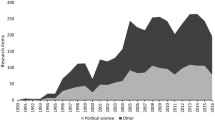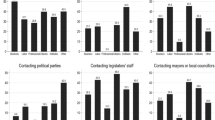Abstract
Effectiveness of ministers is difficult to measure. Ideally, the goal would be to find out if they have been helpful in reconciling people to God and to each other. However, these criteria can only be assessed indirectly. This essay proposes a model of effectiveness and reviews several studies designed to assess one or more of its facets. Although results are only somewhat conclusive, the methods are promising and future research on this foundation is indicated.
Similar content being viewed by others
References
Free, J. and Malony, N.H. (in press), “The incorporating body: How churches gain and hold members,”Review of Religious Research, in press.
Howe, B.R.,Defining ministerial effectiveness in terms of the change effects in the persons ministered to. Unpublished doctoral dissertation, Graduate School of Psychology, Fuller Theological Seminary, Pasadena, California, 1980.
Johnson, M., Lohr, H., Wagner, J. and Barge, W.The relationship between pastors' effectiveness and satisfaction and other psychological and sociological variables: The growth in ministry project research. The Lutheran Church in America: Philadelphia, Pennsylvania, 1975.
Kling, F.R., “A study of testing as related to ministry,”Religious Education, 1958, pp. 243–248.
Majovski, L.F. and Malony, H.N., “The role of psychological assessment in ministerial selection,” Paper presented at the annual meeting of the Religious Association, Knoxville, Tennessee, 1983.
Malony, H.N. “Current research on performance effectiveness among religious leaders” in J. Donaldson, Jr., (Ed.),Research in mental health and religious behavior, Atlanta, Georgia, Psychological Studies Institute, 1976, pp. 242–261.
Malony, H.N., “A framework for understanding the local church: Organization development” in C. Dudley (Ed.),Building effective ministry: Theory and practice in the local church, (New York, Harper and Row, 1983), pp. 175–191.
Nauss, A., “Problems in measuring ministerial effectiveness,”Journal for the Scientific Study of Religion, 11(2) 1972, pp. 141–151.
Nauss, A., “The relation of pastoral mobility to effectiveness,”Review of Religious Research, 15(2) 1974, pp. 80–86.
Nauss, A., “Seven profiles of effective ministeries,”Review of Religious Research, 24(4) 1983, pp. 334–346.
Schell, Jr., M.F.,Total church growth. (Pasadena, California, Fuller Evangelistic Association, 1981).
Schuller, D.S., Strommen, M.P., and Brekke, M.L.Ministry In America. (San Francisco, Harper and Row, 1980).
Smith, S.F. and Malony, H.N.,The relationship between church attendance and agreement with minister's role expectations. Unpublished master's thesis, Graduate School of Psychology, Fuller Theological Seminary, Pasadena, California, 1975.
Webb, S.C.,An inventory of religious activities and interests. (Princeton, New Jersey, Educational Testing Service, 1968).
Author information
Authors and Affiliations
Rights and permissions
About this article
Cite this article
Malony, H.N. Ministerial effectiveness: A review of recent research. Pastoral Psychol 33, 96–104 (1984). https://doi.org/10.1007/BF01086370
Issue Date:
DOI: https://doi.org/10.1007/BF01086370




